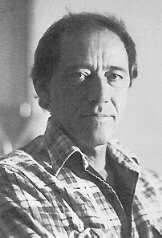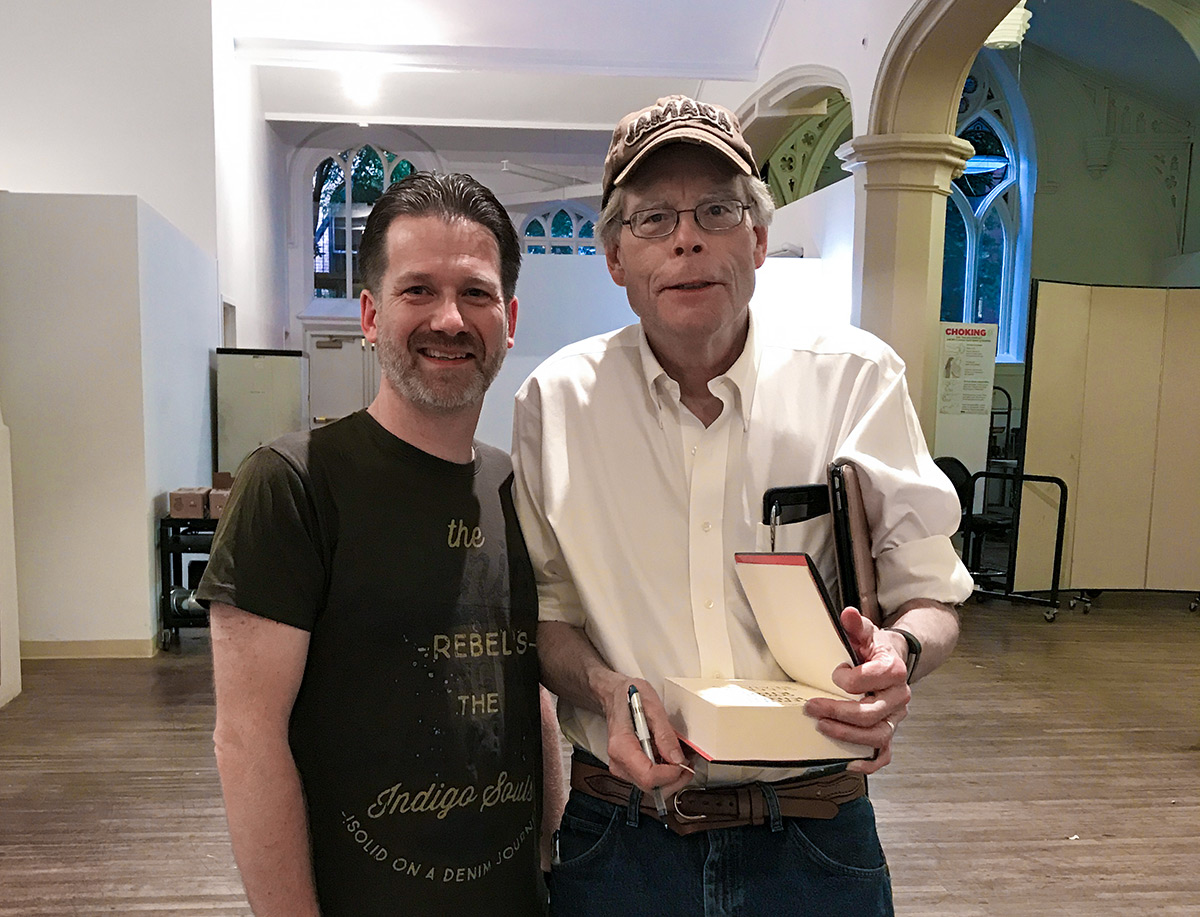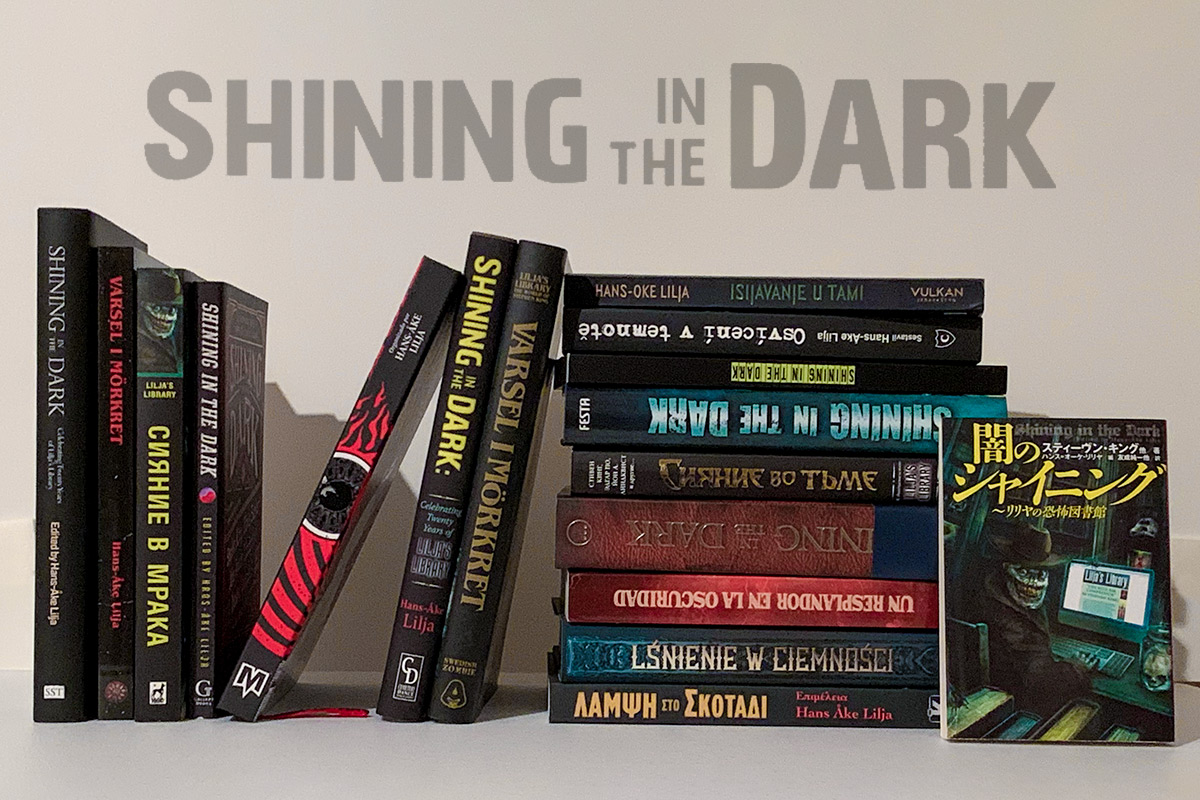The Importance of being Bachman by Stephen King
 This is my second introduction to the so-called "Bachman Books" - a phrase which has come to mean (in my mind, at least) the first four novels published with the Bachman name, the ones which appeared as unheralded paperback originals under the Signet imprint. That first introduction wasn't very good; to me it reads like a textbook case of author obfuscation. But that is not surprising. When it was written, Bachman's alter ego (me, in other words) wasn't in what I'd call a contemplative or analytical mood. Bachman was never created as a short-term alias; he was supposed to be there for the long haul, and when my name came out in connection with his, I was surprised, upset, and pissed off. That's not a state conductive to good essay-writing. This time I may do a little better.
This is my second introduction to the so-called "Bachman Books" - a phrase which has come to mean (in my mind, at least) the first four novels published with the Bachman name, the ones which appeared as unheralded paperback originals under the Signet imprint. That first introduction wasn't very good; to me it reads like a textbook case of author obfuscation. But that is not surprising. When it was written, Bachman's alter ego (me, in other words) wasn't in what I'd call a contemplative or analytical mood. Bachman was never created as a short-term alias; he was supposed to be there for the long haul, and when my name came out in connection with his, I was surprised, upset, and pissed off. That's not a state conductive to good essay-writing. This time I may do a little better.Probably the most important thing I can say about Richard Bachman is that he became real. Not entirely, of course (he said with a nervous smile); I am not writing this in a delusive state. Except...well...maybe I am. Delusion is, after all, something writers of fiction try to encourage in their readers, at least during the time the book or story is open before the reader's eyes, and the writer is hardly immune from this state of ... what shall I call it? How does "directed delusion" sound to you? To me it sounds pretty close to the mark.
At any rate, Richard Bachman began his career not as a delusion but as a sheltered place where I could publish a few early books which I felt readers might like. Then he began to grow and come alive, as the creatures of a writer's imagination so frequently do. I began to imagine his life as a dairy farmer... his wife, the beautiful Claudia Inez Bachman... his solitary New Hampshire mornings, spent milking the cows, getting in the wood, and thinking about his stories...his evenings spent writing these stories, always with a glass of whiskey beside his Olivetti typewriter.
He took on his own reality, that's all, and when his cover was blown, he died. I made light of this in the few interviews I felt required to give on the subject, saying that Richard Bachman had died of cancer of the pseudonym, but it was actually shock that killed him: the realization that sometimes people just won't let you alone. Put another way, Bachman was the vampirish side of my existence, killed by the sunlight of disclosure. My feelings about all this were confused enough (and fertile enough) to bring on a book (a Stephen King book, that is), The Dark Half. It was about a writer whose pseudonym, George Stark, actually comes to life. It's a book my wife has always hated, perhaps because, for Thad Beaumont, the dream of being a writer overwhelms the reality of being a man; for Thad, delusive thinking overtakes rationality completely, with horrific consequences.
I didn't have that problem, though. Really. I put Bachman aside, and although I was sorry that his cover had been blown and he had to die, I would be lying if I didn't say I felt some relief as well.
One of his books, Rage, has been especially troublesome for Stephen King. It has been a factor in a number of nasty (and sometimes mortal) incidents in the real world, incidents in which disturbed teenage boys have held classmates and teachers hostage, have in some cases committed murder. How much responsibility does the author of a book bear when the book seems to form some part of the triggering mechanism for a psychotic or criminal interlude? I don't know. I've spent sleepless nights with the question, a lot of them, and I still don't know. Neither, apparently, does the FBI, who has queried me concerning the book. One psychologist associated with such a case stated that "this novel never walked into a classroom and shot anybody," and that is comforting, but one wonders - one has to wonder - if it is the whole truth. What gives me more comfort is the sure knowledge that the book was written with no bad intent, although it was written by a troubled eighteen year old boy-man who seems a stranger to me now; that boy-man was really neither King nor Bachman but a weird (an perhaps dangerous) hybrid of both.
Like most people, I suspect, I have trouble remembering my teenage years - it's like trying to recall conversations you might have had while running a high fever - but one thing I do remember is that the fury and terror and jagged humor (not wit, the funny stuff in Rage is the furthest thing on earth from wit) found in that story had only one real purpose, and that was the purpose of all my early fiction: to save my life and sanity. What made me feel so crazy so much of the time back then? I don't know, Constant Reader, and that's the truth. My head felt like it was always on the verge of exploding, but I have forgotten why. All I can say in conclusion to this part of my tale is that if there is anyone out there reading this who feels an urge to pick up a gun and emulate Charlie Decke, don't be an asshole. Pick up a pen, instead. Or a pick and shovel. Or any damned thing. Violence is like poison ivy - the more you scratch it, the more it spreads.
The other books in this omnibus were written in much the same spirit as Rage, not as Bachman books per se (Bachman hadn't been invented yet, after all), but in a Bachman state of mind: low rage and simmering despair. Ben Richards, the scrawny, pre-tubercular protagonist of The Running Man (he is about as far from the Arnold Schwarzenegger character in the movie as you can get), crashes his hijacked plane into the Games Authority skyscraper, killing himself but taking hundreds (maybe thousands) of FreeVee executives with him; this is the Richard Bachman version of a happy ending. The conclusions of the other Bachman novels are even more grim. Stephen King has always understood that the good guys don't always win (see Cujo, Pet Sematary, and - perhaps - Christine), but he has also understood that mostly they do. Every day, in real life, the good guys win. Mostly these victories go unheralded (MAN ARRIVES HOME SAFE FROM WORK YET AGAIN wouldn't sell many papers); but they are nonetheless real for all that and fiction should reflect reality.
And yet...
In the first draft of The Dark Half, I had Thad Beaumont quote Donald E. Westlake, a very funny writer who has penned a series of very grim crime novels under the name Richard Stark. Once asked to explain the dichotomy between Westlake and Stark, Westlake said "I write Westlake stories on sunny days. When it rains. I'm Stark." I don't think that made it into the final version of The Dark Half, but I have always loved it (and related to it, as it has become fashionable to say). Bachman - a fictional creation who became more real to me with each published book which bore his byline - was a rainy - day sort of guy if ever there was one.
The good folks mostly win, courage usually triumphs over fear, the family dog hardly ever contracts rabies; these are things I knew at twenty - five, and things I still know now, at the age (almost) of 25 x 2. But I know something else as well: there's a place in most of us where rain is pretty much constant, the shadows are always long, and the woods are full of monsters. It is good to have a voice in which the terrors of such a place can be articulated and its geography partially described, without denying the sunshine and clarity that fill so much of our ordinary lives. For me, Bachman is that voice. In Thinner, he spoke for the first time on his own - it was the only one of the early Bachman novels that had his name on the first draft instead of mine - and it struck me as really unfair that he should have been mistaken for me. And a mistake was just what it felt like, because by then Bachman had become a kind of id for me; he said the things I couldn't, and the thought of him out there on his New Hampshire dairy farm - not a best-selling writer who gets his name in some stupid Forbes list of entertainers too rich for their own good, of his face on the Today show or doing cameos in movies - quietly writing his books, gave him leave to think in ways I could not think and speak in ways I could not speak. And then these news stories came out saying "Bachman is really King," and there was no one - not even me - to defend the dead man, or to point out the obvious: that King was also really Bachman, at least some of the time.
Unfair, I thought, but sometimes life bites you a little, that's all. I determined to put Bachman out of my thoughts and my life, and so I did, for a number of years. Then, while I was writing a novel (a Stephen King novel) called Desperation, Richard Bachman suddenly appeared in my life again.
I was working on a Wang dedicated word processor at that time; it looked like the visiphone in an old Flash Gordon serial. This was paired with a marginally more state-of-the-art laser printer, and from time to time, when an idea occurred to me, I would write down a phrase or a putative title on a scrap of paper and Scotch-tape it to the side of the printer. As I neared the three-quarter mark on Desperation, I had a scrap with a singer word printed on it: REGULATORS. I had had a great idea for a novel, something that had to do with toys, guns, and suburbia. I didn't know if I would ever write it - lots of those "printer notes" never come to anything - but it was certainly cool to think about.
Then, one rainy day (a Richard Stark sort of day) as I was pulling into my driveway, I had an idea. I don't know where it came from; it was totally unconnected to any of the trivia tumbling through my head at the time. The idea was to take characters from Desperation and put them into The Regulators. In some cases, I thought, they could play the same people; in others, they would change; in neither would they do the same things or react in the same ways, because the different stories would dictate different courses of action. It would be, I thought, like the members of a repertory company acting in two different plays.
Then an even more exciting idea struck me. If I could use the rep company concept with the characters, I could use it with the plot itself - I could stack a good many of the Desperation elements in a brand-new configuration, and create a kind of mirror world. I knew even before setting out on this course that plenty of critics would call this twinning a stunt... and they would not be wrong, exactly. But, I thought, it could be a good stunt. Maybe even an illuminating stunt, one which showcased the muscularity and versatility of story, its all but limitless ability to adapt a few basic elements into endlessly pleasing variations, its prankish charm.
But the two books couldn't sound exactly the same, and they couldn't mean the same, any more than an Albee play and one by William Inge can sound and mean the same, even if they are performed on successive nights by the same company of actors. How could I possibly create a different voice?
At first I thought I couldn't, and that it would be best to cosign the idea to the Rube Goldberg bin I keep in the bottom of my mind - the one marked INTERESTING BUT UNWORKABLE CONTRAPTIONS. Then it occurred to me that I had the answer, and had had it all along: Richard Bachman could write The Regulators. His voice sounded superficially the same as mine, simultaneously funnier and more cold - hearted (Bart Davis in Roadwork,my favorite of the early Bachman books, is an excellent example). Of course Bachman was dead, I had announced that myself, but death is actually a minor problem for a novelist - just ask Paul Sheldon, who brought Misery Chastain back for Annie Wilkes, or Arthur Conan Doyle, who brought Sherlock Holmes back from Reichenbach Falls. I didn't actually bring Richard Bachman back from the dead, anyway; I just visualized a box of neglected manuscripts in the basement, with The Regulators on top. Then I transcribed the book Bachman had already written. That was a little tougher... but it was also immensely exhilarating. It was wonderful to hear Bachman's voice again, and what I had hoped might happen did happen: a book rolled out that was kind of fraternal twin to the one I had written under my own name (and the two books were quite literally written back to back, the King book finished on one day and the Bachman book commenced on the very next). They were no more alike than King and Bachman themselves. Desperation is about God; The Regulators is about TV. I guess that makes them both about higher powers, but very different ones just the same.
The importance of being Bachman was always the importance of finding a good voice and a valid point of view that were a little different from my own. Not really different; I am not schizo enough to believe that. But I do believe that there are tricks all of us use to change our perspectives and our perceptions - to see ourselves new by dressing up in different clothes and doing our hair in different styles - and that such tricks can be very useful, a way of revitalizing and refreshing old strategies for living life, observing life, and creating art. None of these comments are intended to suggest that I have done anything great in the Bachman books, and they are surely not made as arguments for artistic merit. But I love what I do too much to want to go stale if I can help it. Bachman has been one way in which I have tried to refresh my craft, and to keep from being too comfy and well-padded.
These early books show some progression of the Bachman persona, I hope, and I hope they also show the essence of that persona. Dark - toned, despairing even when he is laughing (despairing most when he's laughing, in fact), Richard Bachman isn't a fellow I'd want to be all the time, even if he were still alive...but it's good to have that option, good to have that way out, good to have that window on the world, polarized though it may be. Still, as the reader works his or her way through these stories, he/she may discover that Dick Bachman has one thing in common with Thad Beaumont's alter ego, George Stark: he's not a very nice guy.
Still, I have to wonder if there are any other good manuscripts, at or near completion, in that box found by the former Mrs. Bachman in the cellar of their New Hampshire farmhouse.
Sometimes I wonder about that a lot.
Richard Bachman links
Richard Bachman
Bachman - The Official Biography
Bachman Exposed by Steve Brown





